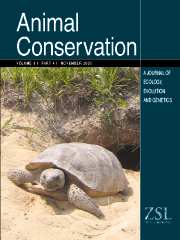Crossref Citations
This article has been cited by the following publications. This list is generated based on data provided by
Crossref.
Wessels, K. J.
Reyers, B.
and
Van Jaarsveld, A. S.
2000.
Incorporating land cover information into regional biodiversity assessments in South Africa.
Animal Conservation,
Vol. 3,
Issue. 1,
p.
67.
Hopkinson, Paul
Travis, Justin M. J.
Prendergast, John R.
Evans, Julianne
Gregory, Richard D.
Telfer, Mark G.
and
Williams, Paul H.
2000.
A preliminary assessment of the contribution of nature reserves to biodiversity conservation in Great Britain.
Animal Conservation,
Vol. 3,
Issue. 4,
p.
311.
Reddy, Sushma
and
Dávalos, Liliana M.
2003.
Geographical sampling bias and its implications for conservation priorities in Africa.
Journal of Biogeography,
Vol. 30,
Issue. 11,
p.
1719.
Rondinini, Carlo
Wilson, Kerrie A.
Boitani, Luigi
Grantham, Hedley
and
Possingham, Hugh P.
2006.
Tradeoffs of different types of species occurrence data for use in systematic conservation planning.
Ecology Letters,
Vol. 9,
Issue. 10,
p.
1136.
KÜPER, W.
SOMMER, J. H.
LOVETT, J. C.
and
BARTHLOTT, W.
2006.
Deficiency in African plant distribution data – missing pieces of the puzzle.
Botanical Journal of the Linnean Society,
Vol. 150,
Issue. 3,
p.
355.
Romo, Helena
García‐Barros, Enrique
and
Lobo, Jorge M.
2006.
Identifying recorder‐induced geographic bias in an Iberian butterfly database.
Ecography,
Vol. 29,
Issue. 6,
p.
873.
Elith, Jane
and
Leathwick, John
2007.
Predicting species distributions from museum and herbarium records using multiresponse models fitted with multivariate adaptive regression splines.
Diversity and Distributions,
Vol. 13,
Issue. 3,
p.
265.
Soria‐Auza, Rodrigo W.
and
Kessler, Michael
2008.
The influence of sampling intensity on the perception of the spatial distribution of tropical diversity and endemism: a case study of ferns from Bolivia.
Diversity and Distributions,
Vol. 14,
Issue. 1,
p.
123.
Donoso, David A.
Salazar, Fernanda
Maza, Florencio
Cárdenas, Rafael E.
and
Dangles, Olivier
2009.
Diversity and distribution of type specimens deposited in the Invertebrate section of the Museum of Zoology QCAZ, Quito, Ecuador.
Annales de la Société entomologique de France (N.S.),
Vol. 45,
Issue. 4,
p.
437.
Cayuela, L.
Golicher, D. J.
Newton, A. C.
Kolb, M.
de Alburquerque, F. S.
Arets, E. J. M. M.
Alkemade, J. R. M.
and
Pérez, A. M.
2009.
Species Distribution Modeling in the Tropics: Problems, Potentialities, and the Role of Biological Data for Effective Species Conservation.
Tropical Conservation Science,
Vol. 2,
Issue. 3,
p.
319.
Zafra‐Calvo, Noelia
Rodríguez, Miguel Á.
and
Lobo, Jorge M.
2010.
Discerning the impact of human‐mediated factors on biodiversity using bioclimatic envelope models and partial regression techniques.
Diversity and Distributions,
Vol. 16,
Issue. 2,
p.
300.
GIOIA, PAUL
2010.
Managing biodiversity data within the context of climate change: towards best practice.
Austral Ecology,
Vol. 35,
Issue. 4,
p.
392.
Smith, Robert J.
Monadjem, Ara
Magagula, Cebisile N.
and
Mahlaba, Themba A.M.
2010.
Conservation planning and viability: problems associated with identifying priority sites in Swaziland using species list data.
African Journal of Ecology,
Vol. 48,
Issue. 3,
p.
709.
De Ornellas, Paul
Milner-Gulland, E.J.
and
Nicholson, Emily
2011.
The impact of data realities on conservation planning.
Biological Conservation,
Vol. 144,
Issue. 7,
p.
1980.
Wolf, Adam
Anderegg, William R. L.
Ryan, Sadie J.
and
Christensen, Jon
2011.
Robust detection of plant species distribution shifts under biased sampling regimes.
Ecosphere,
Vol. 2,
Issue. 10,
p.
art115.
Botts, Emily A.
Erasmus, Barend F. N.
and
Alexander, Graham J.
2011.
Geographic sampling bias in the South African Frog Atlas Project: implications for conservation planning.
Biodiversity and Conservation,
Vol. 20,
Issue. 1,
p.
119.
Baxley, Danna
Lipps, Gregory J
and
Qualls, Carl P
2011.
Multiscale Habitat Selection by Black Pine Snakes (Pituophis melanoleucus lodingi) in Southern Mississippi.
Herpetologica,
Vol. 67,
Issue. 2,
p.
154.
Rodrigues, Ana S.L.
2013.
Encyclopedia of Biodiversity.
p.
127.
Rodrigues, Ana S.L.
2013.
Encyclopedia of Biodiversity.
p.
121.
Yang, Wenjing
Ma, Keping
and
Kreft, Holger
2014.
Environmental and socio‐economic factors shaping the geography of floristic collections in China.
Global Ecology and Biogeography,
Vol. 23,
Issue. 11,
p.
1284.




